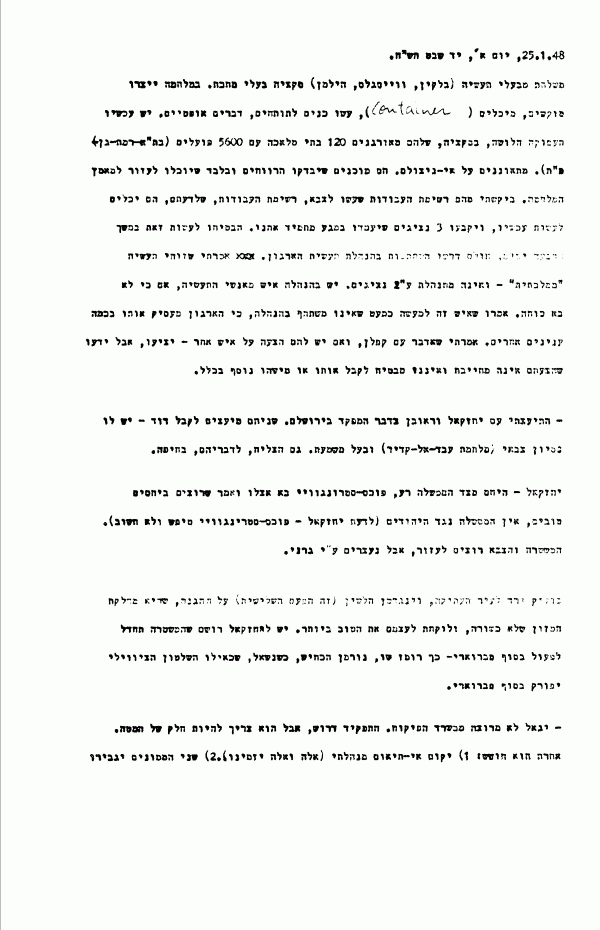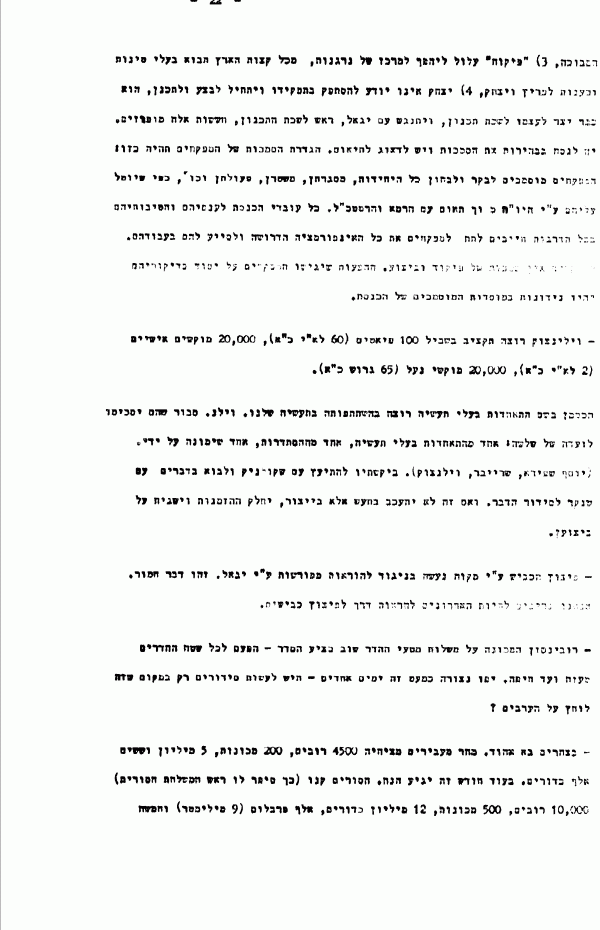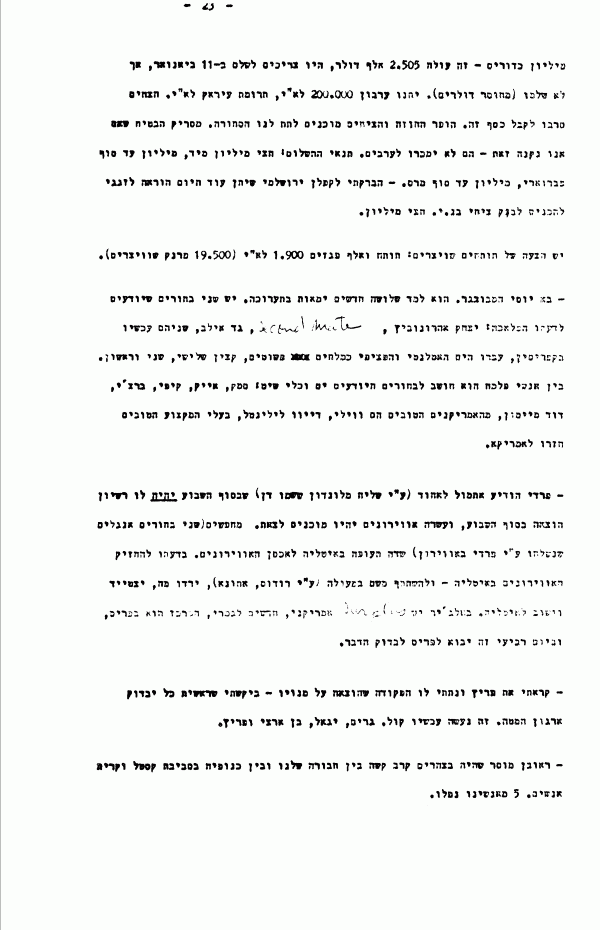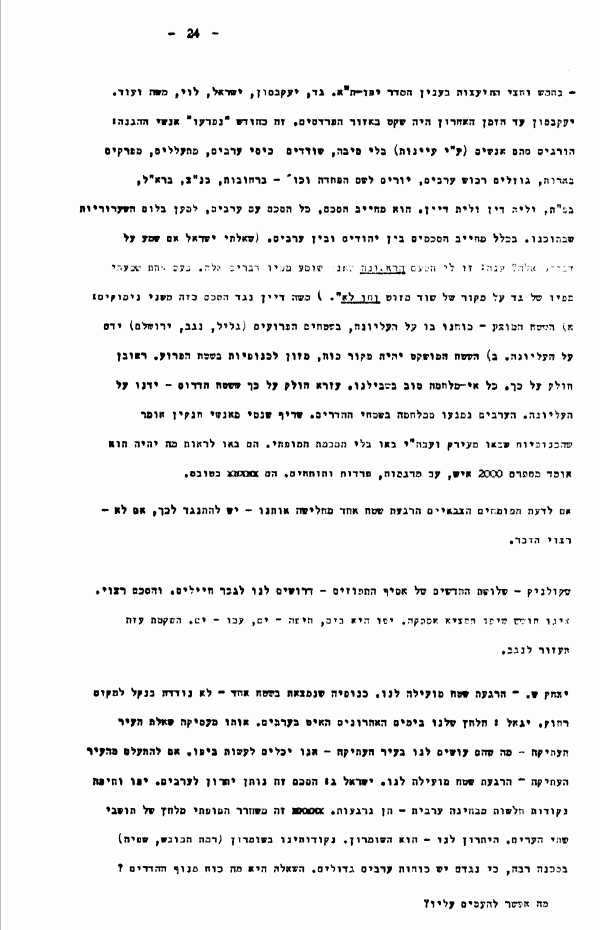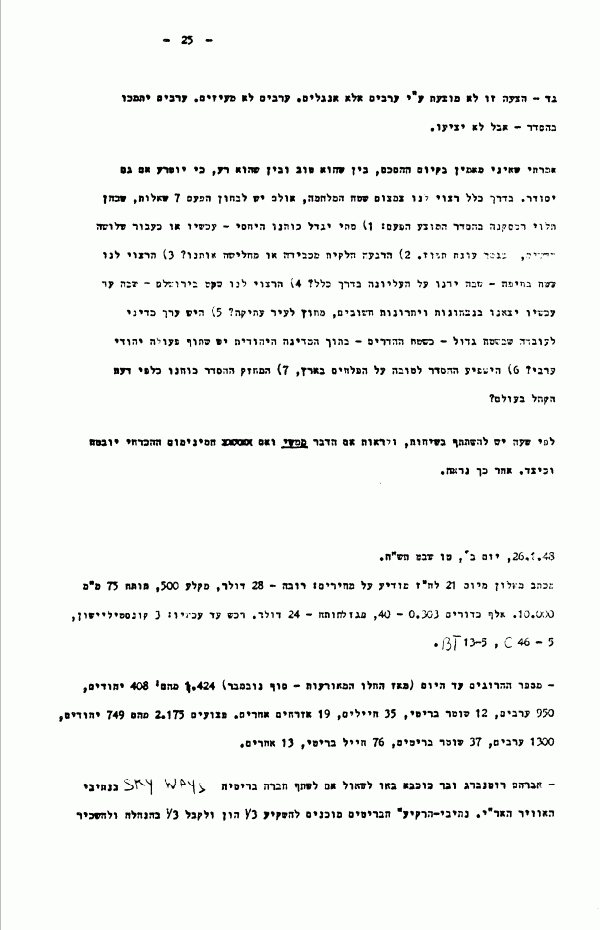1
of
Places:
Metal
Ramat Gan
Haifa
Jerusalem
Gaza
Jaffa
Czechoslovakia
New York
Magen
Athens
Dan
London
Rhodes
Paris
Ayanot
Acre
Ramat HaKovesh
People:
The use of the photograph is subject to the Copyright Law, 2007
25.01.1948
225354
Sunday, 25 January 1948 A delegation of manufacturers (Belkin, Weissglass, Hillman), a section of the metal [factory] owners. During the [world] war, [factories in the country] produced mines [and] containers, made barrels for cannons, optical pieces. Now business is slow. Their section consists of 120 workshops with 500-600 workers (in Tel Aviv, Ramat Gan, and Petah Tikva). They’re complaining about being underused. They’re prepared to have their profits inspected, as long as they can contribute to the war effort. I asked them for a list of the work projects they did for the [British] army, the work projects they believed they could do now, and to appoint 3 representatives who will be in constant contact with us. They promised to do this over the course of four days, but insisted on participating in the management of the “Organization’s” industry. I said that this is a “state-level” industry – and not managed by representatives. There’s someone from industry in the management [Mordechai Kaplan], although he’s not a representative. They said that this person almost never participate in the management, because the “Organization” keeps him busy doing other things. I said I would speak with Kaplan, and if they have a suggestion for someone else – to suggest, but they should know that their suggestion is not binding and that I don’t promise to accept him or any other person. I consulted with Yehezkel [Sahar] and Reuven [Shiloah] regarding the commander in Jerusalem. They both recommend David [Shaltiel] – he has military experience (the Abd al-Qadir war [in Algiers]) and is disciplined. He was also successful, according to them, [as city commander] in Haifa. Yehezkel: The attitude on the part of the government is bad. [Secretary to the Commissioner] Fox-Strangways came to see him and said: We want good relations; the government is not against the Jews (in Yehezkel’s view – Fox-Strangways is stupid and unimportant). The government and the army want to help, but are being stopped by [First Secretary] Gurney. [District Commissioner for Jerusalem] Pollock went down to the Old City. [Mordechai] Weingarten informed (for the third time) on the Haganah, that it’s distributing the food [brought into the Old City] inappropriately and taking the best for itself. Yehezkel is under the impression that the police will stop operations at the end of February – so implies [Deputy Police Chief] Shaw [sp.]. [Lt.-Col. Oscar] Norman [head of British military intelligence] denied, when asked, if the civilian rule will be dismantled at the end of February. – Yigael [Yadin] is displeased with an office of oversight [next to the Ministry Of Defense]. The function is necessary, but it should be part of the [General] Staff; otherwise, he fears: 1. There will be an administrative lack of coordination ([different parties] purchasing [equipment]). 2. Having two supervisors will increase confusion. 3. “Oversight” could turn into a complaints center. People with grudges and grievances from all across the country will descend on Fritz [Eshet] and Yitzhak [Sadeh]. 4. Yitzhak does not know how to limit himself to his role and will start taking action and planning. He’s already established a planning bureau for himself, and will clash with Yigael, head of the planning bureau [in the General Staff]. These concerns are exaggerated. The responsibilities need to be clearly formulated and coordination should be ensured. The responsibilities of overseers would be as follows: Overseers would be authorized to scrutinize and examine all the units, their structure, their governance, operations, etc. as instructed by the chairman [D. Ben-Gurion] in coordination with the Chief of the National Headquarters and Chief of Staff. All the workers of the “Knesset” [one of the Haganah’s codenames] across all branches and divisions at all ranks must give the overseers all the necessary information and help them in their work. The overseers have no command or operational authority. The proposals that overseers submit on the basis of their examinations will be discussed in authorized “Knesset” bodies. – Vilenchuk wants a budget for 100 PIATs (P£ 60 each), 20,000 anti-personnel mines (P£ 2 each), 20,000 landmines (65 grush [1/100 of a P£] each). The engineer [Yitzhak] Echtmann [sp.], on behalf of the Manufacturers’ Association, wants [the Association] to participate in our manufacturing. Vilenchuk believes that they’ll agree to a committee of three: one from the Manufacturers’ Association, one from the Histadrut, one to be appointed by me (Yosef Shapira, Schreiber [Zvi Shariv], Vilenchuk). I asked that he consult with Shkolnik and discuss arrangements with [Aryeh] Shenkar [president of the Manufacturers’ Association]. This committee would not be involved in Ta’as [military industry] but rather in production, issuing requisitions and supervising their implementation. – The road near Mikve [Yisrael] was blown up against Yiga[e]l’s explicit orders. This is very serious. We need to be seen as the last ones to be blowing up roads. – Robinson [British government official], who’s in charge of citrus fruit delivery, again proposes an arrangement – this time for all the citrus areas, from Gaza to Haifa. For two days now Jaffa is virtually under siege. Should arrangements be made only where there’s pressure on the Arabs? – In the afternoon Ehud [Avriel] came. Tomorrow 4,500 rifles, 200 machine [gun]s, 5,060,000 bullets are being shipped from Czechoslovakia. [The shipment] will arrive a month from now. The Syrians bought (so the head of the Syrian delegation told him) 10,000 rifles, 500 machine [gun]s, 12 million bullets, 1,000 (9 mm) Parabellum [pistols], and 5 million bullets – this costs $ 2.5 million. They were supposed to pay on January 11, but they didn’t (for lack of dollars). They paid a deposit of P£ 200,000, a donation by Iraq to Eretz Israel [Palestine]. The Czechs refused to accept this money. The contract was breached and the Czechs are prepared to give us the merchandise. [Czeck Foreign Minister Jan] Masaryk promise that if we buy it – they won’t sell to the Arabs. Terms of payment: $ 0.5 million immediately, a million by the end of February, a million by the end of March. I cabled Kaplan, in Jerusalem, to instruct [Mordechai] Zagagi today to deposit half a million in a Czech bank in New York. There’s an offer of Swiss cannons: a cannon and 1,000 shells P£ 1,900 (19,500 Swiss francs). – Yossi Hamburger [Harel] came: He had three months of seamanship training [in a Haganah course in north Tel Aviv]. There are two men who know the craft, in his view: Yitzhak Aronowicz [“Ike”], second mate, and Gad Hilev. Both are in Cyprus now [as captains of the Pans, clandestine immigrant ships]. They transited the Atlantic and the Pacific oceans [in the positions of] a simple sailor, and a third, second, and first mate. Among Palmach men, ones he regards as knowing the sea and seacraft: Samek [Shmuel Yanai], Ike [Yitzhak Aronowicz], Kippy [Aryeh Kaplan], Bearchik [Dov Magen-Lifshitz], David Maimon. Among the Americans, important ones are Willie [Rostoker] and Dave Lilienthal. The skilled professionals have returned to America. – Yesterday Freddy [Fredkins] informed Ehud [Avriel] (by way of a messenger from London named Dan [the pilot Dan Tolkowsky]) that at the end of the week he will have an export license, and ten airplanes will be ready to go. Two English men, sent by Freddy by plane, are looking for an airfield in Italy to store the airplanes. He believes the planes should be kept in Italy, and participate in operations from there (near Rhodes, Athens). They’ll land here, stock up, and return to Italy. Algiers has a surplus of completely new American equipment. The center is in Paris, and this Wednesday he’ll go to Paris to check it out. – I called for Fritz [Eshet] and gave him the order that’s been issued about his appointment [for oversight]. I asked that first of all he examine the organization of the Staff. Currently this is being done by Col. Green, Yigael [Yadin], Ben-Artzi, and Fritz. – Reuven [Shiloah] reports that there was a fierce battle in the afternoon between a group of ours and a gang near Kastel and Kiryat ‘Anavim. Five of our men were killed. – At 5:30 a consultation regarding arrangements between Jaffa and Tel Aviv: Gad [Meknes], [Yosef] Yaakovson, Yisrael [Galili], Levi [Shkolnik], Moshe [Dayan], and others. Yaakovson: Until recently it was quiet in the orchard areas. This month Haganah men have been “out of control”: They’re killing random people ([for example,] near ‘Ayanot) for no reason, mugging Arabs, abusing, destroying wells, stealing Arab property, shooting in order to intimidate, etc. – in Rehovot, in Ness Ziona, in Rishon LeZion, in Petah Tikva – no justice or judge [i.e., an uncontrollable situation]. This necessitates an agreement, any agreement, with the Arabs in order to put a stop to the scandals within us. In general it necessitates agreements between Jews and Arabs. (I asked Yisrael if he’d heard about these things. He answered: “This is the first time I’m hearing these things from him. On one occasion I heard from Gad [Meknes] about an incident involving the theft of mazut [fuel oil], but nothing else.” Moshe Dayan is against such an agreement, for two reasons: A) The area proposed [for an agreement by Yaakovson] – we have the upper hand there; in the unruly areas (Galilee, Negev, Jerusalem) they have the upper hand. B) The quieted area will become a source of power and food for gangs in the unruly area. Reuven [Shiloah] disputes this. Any non-war is good for us. Ezra [Danin] disagrees that we have the upper hand in the southern area. The Arabs have refrained from war in the citrus areas. Sharif Shanti, one of Hankin’s men, says that the gangs that arrived from Iraq and Transjordan came without the Mufti’s consent. They came to see what would happen. He says they number about 2,000 men, with mortars, mules, and cannons [he is referring to Qawuqji’s Arab Liberation Army]. They’re in Tubas. If the military experts believe that quieting [just] one area weakens us – we should oppose it. If not – then it’s desirable. Shkolnik [Eshkol]: The three months of orange harvest – are necessary for us to strengthen our soldiers and [achieve] a desirable agreement. He’s not concerned that Jaffa will provide supplies [for gangs]. Jaffa’s by the sea, Haifa – sea, Acre – sea [and able to make maritime contact at any time]. Quieting Gaza will help the Negev. Yitzhak S. [Sadeh]: Calming an area helps us. A gang located in one area does not easily relocate to a faraway site. Yigael [Yadin]: The pressure we’ve applied in recent days has slowed the Arabs down. He’s preoccupied by the question of the Old City in Jerusalem. What they’re doing to us in the Old City – we can do in Jaffa. If we ignore the Old City – calming an area helps us. Yisrael [Galili]: This agreement gives an advantage to the Arabs. Jaffa and Haifa are weak spots from the Arab perspective. [With this agreement] they calm down. That releases the Mufti from the pressure applied by residents of those two cities. The [desirable] advantage for us – is in Samaria. Our settlements in Samaria (Ramat HaKovesh, Shfeya) are in great danger, because they’re facing large Arab forces. The question is: How much force of leverage do the citruses provide? What can it [this leverage] bear? Gad [Meknes]: This proposal is not being made by Arabs but [by the] English. Arabs don’t dare. Arabs will support the arrangement – but won’t propose it. I said that I don’t believe in maintaining the agreement, whether it’s good or bad, because it will be breached even if it’s implemented. Usually we want to reduce the area of combat, but this time we have to examine 7 questions on which the conclusion regarding the proposed arrangement depends: 1. When will our relative be power greater – now or in three months, after the orange season? 2. Does a relative calm make us stronger or weaker? 3. Do we want quiet in Haifa – where we usually have the upper hand? 4. Do we want quiet in Jerusalem – where so far we’ve had important victories and advantages, outside of the Old City? 5. Is there political value to the fact that in a large part of the Jewish state – such as the citrus area – there’s Jewish-Arab cooperation? 6. Will the arrangement have a positive influence on the [Arab] peasants in the country? 7. Does the arrangement make us stronger in terms of global public opinion? For now we have to participate in the talks and see if this is practicable and whether the necessary minimum can be guaranteed and how. Then we’ll see.





